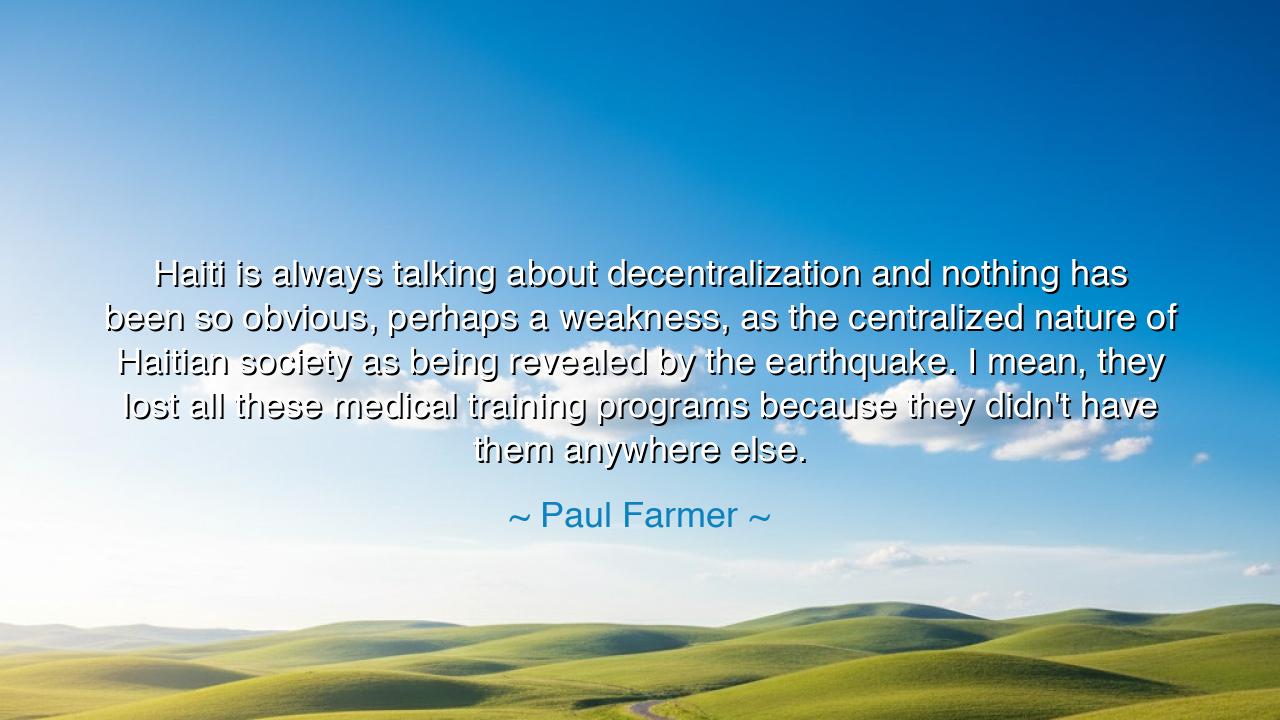
Haiti is always talking about decentralization and nothing has
Haiti is always talking about decentralization and nothing has been so obvious, perhaps a weakness, as the centralized nature of Haitian society as being revealed by the earthquake. I mean, they lost all these medical training programs because they didn't have them anywhere else.






Hear the voice of Paul Farmer, physician and servant of humanity, who declared with sorrow and clarity: “Haiti is always talking about decentralization and nothing has been so obvious, perhaps a weakness, as the centralized nature of Haitian society as being revealed by the earthquake. I mean, they lost all these medical training programs because they didn’t have them anywhere else.” In these words we find a lesson written not in ink but in suffering: that when all power, all learning, all life is bound in one place, a single calamity can bring ruin to all.
The meaning of this utterance lies in the fragility of centralization. Farmer speaks of Haiti, a nation long burdened by hardship, where resources and institutions were gathered mainly in the capital. When the earthquake of 2010 struck, it did not merely break stones and buildings—it shattered the very structure of society. Hospitals fell, schools collapsed, and the precious medical training programs—the lifeblood of the nation’s healing—were lost, for they had no roots beyond the city. Thus, he shows us that the strength of a people must be spread wide, so that when one branch is broken, the tree still lives.
The origin of this wisdom flows from Farmer’s own life’s work. A physician who dedicated himself to the poor, he saw firsthand how health and justice are entwined. In Haiti, he labored among the forgotten, building clinics and training healers, always urging that care must reach every valley and village, not only the cities. His words after the earthquake were not criticism alone, but grief—for he had seen with his own eyes how centralization turned tragedy into devastation, leaving the nation wounded at its very core.
History too bears witness to this truth. Recall the fall of ancient Babylon, whose glory was bound within its towering walls. When those walls were breached, the empire crumbled swiftly, for its lifeblood flowed only from its center. Contrast this with the Roman roads and aqueducts, which carried knowledge, goods, and power across the empire. Though Rome too fell in time, its decentralized lifelines allowed fragments of its civilization to endure for centuries. The lesson is eternal: resilience is born not of concentration, but of distribution.
The emotional strength of Farmer’s words lies in their compassion. He does not speak as a distant scholar, but as one who walked among the wounded, who saw students and teachers lost, their dreams buried beneath rubble. His lament reminds us that decentralization is not merely a political theory—it is a matter of life and death. When knowledge, healing, and opportunity are spread widely, the people stand firm even when disaster strikes. But when they are locked in one fragile place, the people are left helpless when that place is destroyed.
The lesson for us is clear: in our nations, our communities, even in our families, let us not hoard all strength in one place. Build many centers of learning, many sources of healing, many roots of culture. Teach the young in every town, not only in the capital. Train the healers in every village, not only in the universities of the great cities. Share leadership, share knowledge, share power—so that the fall of one does not mean the fall of all.
Therefore, let your actions reflect this wisdom. If you are a leader, distribute resources where they are most needed, not only where they are most visible. If you are a teacher, carry knowledge to the forgotten corners. If you are a citizen, support the growth of many centers of strength in your land. For resilience is built not by towers, but by networks; not by central might, but by shared strength.
And so remember the words of Paul Farmer: the earthquake revealed the weakness of centralization. Let us take this lesson into every age, for storms and earthquakes come in many forms—natural, political, or social. Only those who prepare by spreading their roots wide will endure. Respect this truth, and you will build not only for today, but for generations yet unborn.






AAdministratorAdministrator
Welcome, honored guests. Please leave a comment, we will respond soon